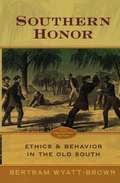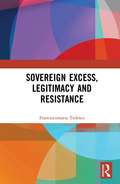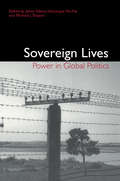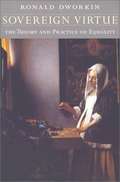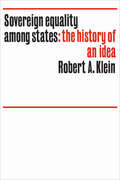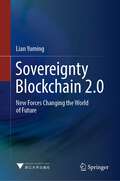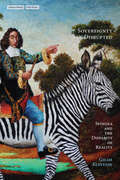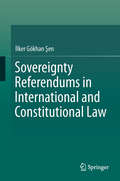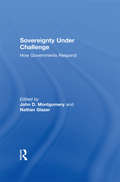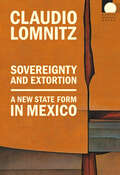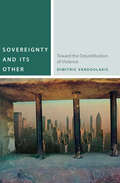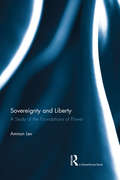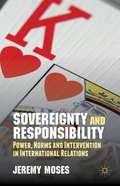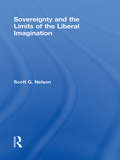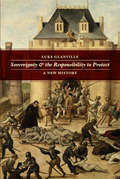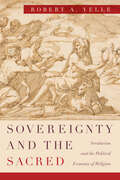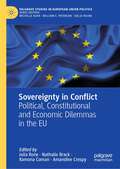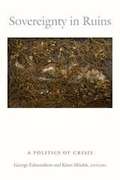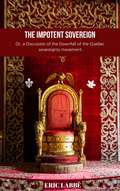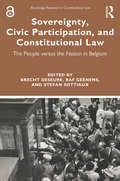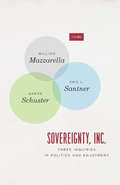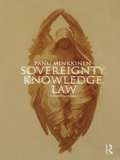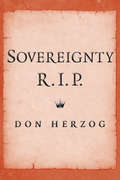- Table View
- List View
Southern Honor: Ethics and Behavior in the Old South (Revised)
by Bertram Wyatt-BrownSouthern Honor revolutionized our understanding of the antebellum South, revealing how Southern men adopted an ancient honor code that shaped their society from top to bottom. Using legal documents, letters, diaries, and newspaper columns, Wyatt-Brown offers fascinating examples to illuminate the dynamics of Southern life throughout the antebellum period. He describes how Southern whites, living chiefly in small, rural, agrarian surroundings, in which everyone knew everyone else, established the local hierarchy of kinfolk and neighbors according to their individual and familial reputation. By claiming honor and dreading shame, they controlled their slaves, ruled their households, established the social rankings of themselves, kinfolk, and neighbors, and responded ferociously against perceived threats. The shamed and shameless sometimes suffered grievously for defying community norms. Wyatt-Brown further explains how a Southern elite refined the ethic. Learning, gentlemanly behavior, and deliberate rather than reckless resort to arms softened the cruder form, which the author calls "primal honor." In either case, honor required men to demonstrate their prowess and engage in fierce defense of individual, family, community, and regional reputation by duel, physical encounter, or war. Subordination of African-Americans was uppermost in this Southern ethic. Any threat, whether from the slaves themselves or from outside agitation, had to be met forcefully. Slavery was the root cause of the Civil War, but, according to Wyatt-Brown, honor pulled the trigger.
Sovereign Excess, Legitimacy and Resistance
by Francescomaria TedescoWhen talking about his film Salò, Pasolini claimed that nothing is more anarchic than power, because power does whatever it wants, and what power wants is totally arbitrary. And yet, upon examining the murderous capital of modern sovereignty, the fragility emerges of a power whose existence depends on its victims’ recognition. Like a prayer from God, the command implores to be loved, also by those whom it puts to death. Benefitting from this "political theurgy" as the book calls it (the idea that a power, like God, claiming to be full of glory, constantly needs to be glorified) is Barnardine, the Bohemian murderer in Shakespeare’s Measure for Measure, as he, called upon by power to the gallows, answers with a curse: ‘a pox o’ your throats’. He does not want to die, nor, indeed, will he. And so, he becomes sovereign. On a level with and against the State.
Sovereign Lives: Power in Global Politics
by Jenny Edkins Véronique Pin-Fat Michael J. ShapiroFor International Relations scholars, discussions of globalization inevitably turn to questions of sovereignty. How much control does a country have over its borders, people and economy? Where does that authority come from? Sovereign Lives explores these changes through reading of humanitarian intervention, human rights discourses, securitization, refugees, the fragmentation of identities and the practices of development.
Sovereign Virtue: The Theory And Practice Of Equality
by Ronald DworkinEquality is the endangered species of political ideals. Even left-of-center politicians reject equality as an ideal: government must combat poverty, they say, but need not strive that its citizens be equal in any dimension. In his new book Ronald Dworkin insists, to the contrary, that equality is the indispensable virtue of democratic sovereignty. A legitimate government must treat all its citizens as equals, that is, with equal respect and concern, and, since the economic distribution that any society achieves is mainly the consequence of its system of law and policy, that requirement imposes serious egalitarian constraints on that distribution. What distribution of a nation's wealth is demanded by equal concern for all? Dworkin draws upon two fundamental humanist principles--first, it is of equal objective importance that all human lives flourish, and second, each person is responsible for defining and achieving the flourishing of his or her own life--to ground his well-known thesis that true equality means equality in the value of the resources that each person commands, not in the success he or she achieves. Equality, freedom, and individual responsibility are therefore not in conflict, but flow from and into one another as facets of the same humanist conception of life and politics. Since no abstract political theory can be understood except in the context of actual and complex political issues, Dworkin develops his thesis by applying it to heated contemporary controversies about the distribution of health care, unemployment benefits, campaign finance reform, affirmative action, assisted suicide, and genetic engineering.
Sovereign equality among states: The history of an idea
by Robert KleinUncritical adherence to the concept of sovereign equality is a major stumbling block to the reorganization of the world community. This study is the first place to trace the origins of the wording of the concept as it appears in the UN charter, as well as its historical antecedents and philosophical foundations. Two contradictory ways of viewing sovereign states and maintaining order among them are discussed. According to one, states are abstract entities with a fictitious personality; according to this view, international affairs must be based on the concept of great-power primacy. The opposite view, brought to world attention at the Hague Peace Conference of 1907, endows states with human personalities and transfers to them the political principle of individual equality. The book develops the tension between the real world of international politics and the abstract world where opposing concepts abide.
Sovereignty Blockchain 2.0: New Forces Changing the World of Future
by Lian YumingThis book is a continuation and deepening of Sovereign Blockchain 1.0. It mainly includes three views: 1) Blockchain is a super public product based on digital civilization. 2) The Internet is an advanced level of industrial civilization, the core of which is connection; blockchain is an important symbol of digital civilization, the essence of which is reconstruction. 3) Digital currency will trigger a comprehensive change in the economic field, and digital identity will reconstruct the governance model in the social field, thereby changing the order of civilization.This book is not only a popular science book based on blockchain thinking, theory and application research, but also a scholarly work on the technical and philosophical issues of governance and the future. By reading Sovereign Blockchain 2.0, policymakers can quickly understand the basic knowledge and frontier dynamics of science and technology; science and technology workers can grasp the general trend, seize opportunities, face problems and difficulties, aim at the world's science and technology frontier and lead the direction of science and technology development; experts and scholars in law and legal fields can see new ideas, concepts and models of data governance; social science researchers can discover data sociology and data philosophy issues.
Sovereignty Disrupted: Spinoza and the Disparity of Reality (Cultural Memory in the Present)
by Gilah KletenikAnthropocentrism, white supremacy, and cishetsexism remain with us. The intransigence of such oppressions, this book proposes, is stayed by the unrecognized force that sovereignty maintains across the domains of "Western" philosophy. To corroborate this original thesis, the book uncovers how the rationales of sovereignty secure dominant "Western" theories about the nature of reality, the promise of reason, and the status of humans. Such approaches rely on properties of sovereignty that essentialize difference, naturalize hierarchy, and valorize autonomy. To redress these models and the supremacies they promote, Gilah Kletenik turns to Spinoza. Through a fresh reading of his Ethics, Kletenik develops an egalitarian alternative that starts with denaturalizing sovereignty. It is not a coincidence that Spinoza critiques the hegemonic rationales of "Western" philosophy nor that his doing so has eluded analysis. This is because his insurrection against "Western" sovereignties is sparked by the scintillas of immanence that he inherits from medieval Jewish and Islamic naturalism, the very philosophies that Christian, "Western" thought has repressed. This book recovers these marginalized voices, exposing centuries of interpretations that assimilate Spinoza's program to the sovereignties he disrupts. Kletenik thinks with Spinoza to unmask the supremacies of colonialism, neoliberalism, and cishetsexism alongside the sovereignties anchoring contemporary theory. In critiquing "Western" philosophy, Kletenik limns a more ethical alternative, oriented by immanence and disparity.
Sovereignty Referendums in International and Constitutional Law
by İlker Gökhan ŞenThis book focuses on sovereignty referendums, which have been used throughout different historical periods of democratization, decolonization, devolution, secession and state creation. Referendums on questions of sovereignty and self-determination have been a significant element of the international political and legal landscape since the French Revolution, and have been a central element in the resolution of territorial issues from the referendum in Avignon in 1791 until today. More recent examples include Quebec, East Timor, New Caledonia, Puerto Rico and South Sudan. The global aim of this book is to achieve a better empirical and legal understanding of sovereignty referendums and related problems in international and national law and politics. Accordingly, it presents readers a comprehensive study of sovereignty referendums from the perspectives of both international and constitutional law.
Sovereignty Under Challenge: How Governments Respond
by Nathan GlazerSovereignty-the authority of a state to wield ultimate power over its territory, its citizens, its institutions-is everywhere undergoing change as states respond in various ways to the challenges posed, from above and below. "Above" the state is the widening net of international institutions and treaties dealing with human rights, trade, investment, and monetary affairs; and "below" it are rising claims within states from long-resident groups discontented with the political order and from new migrants testing its authority. Sovereignty under Challenge deals with a range of such challenges and responses, analyzed in authoritative studies by leading scholars. The introductory chapter sets forth the theme that sovereignty is asserted clearly, but often unpredictably, when governments respond to challenge. It suggests ways of classifying these responses as variables that help explain the changing nature of sovereignty. Part 1, "The Citizen and the State," treats the rising tide of dual citizenship and the concerns this arouses in the United States; the work of national human rights commissions in Asia; and the challenge posed to the state by the Falungong movement in China. The two chapters in Part 2, "The Government as Decision-Maker," examine Japan's response to global warming and the problems of the World Health Organization in orchestrating collaboration among Southeast Asian states in implementing infectious disease control. Part 3, "Sovereignty and Culture," looks at conflicts engendered by outside change on indigenous economic, cultural, and legal institutions in India, Fiji, Indonesia, and Malaysia. The chapters in Part 4, "Sovereignty and the Economy," analyze the economic and cultural instability induced by Chinese migration to Russia's far east; the impact on state sovereignty brought about by transnational regulatory campaigns and social activism; the question of indigenous land rights in the Philippines; and the impact of transnational corporations on information technology in Asia. A concluding chapter offers a global assessment of the current status of state sovereignty.
Sovereignty and Extortion: A New State Form in Mexico (Public Planet Books)
by Claudio LomnitzOver the past fifteen years in Mexico, more than 450,000 people have been murdered and 110,000 more have been disappeared. In Sovereignty and Extortion, Claudio Lomnitz examines the Mexican state in relation to this extreme violence, uncovering a reality that challenges the familiar narratives of “a war on drugs” or a “failed state.” Tracing how neoliberal reforms, free trade agreements, and a burgeoning drug economy have shaped Mexico’s sociopolitical landscape, Lomnitz shows that the current crisis does not represent a tear in the social fabric. Rather, it reveals a fundamental shift in the relationship between the state and the economy in which traditional systems of policing, governance, and the rule of law have eroded. Lomnitz finds that power is now concentrated in the presidency and enforced through militarization, which has left the state estranged from itself and incapable of administering justice or regaining control over violence. Through this critical examination, Lomnitz offers a new theory of the state, its forms of sovereignty, and its shifting relation to capital and militarization.
Sovereignty and Its Other: Toward the Dejustification of Violence (Commonalities)
by Dimitris VardoulakisIn this new book, Dimitris Vardoulakis asks how it is possible to think of a politics that is not commensurate with sovereignty. For such a politics, he argues, sovereignty is defined not in terms of the exception but as the different ways in which violence is justified. Vardoulakis shows how it is possible to deconstruct the various justifications of violence. Such dejustifications can take place only by presupposing an other to sovereignty, which Vardoulakis identifies with radical democracy. In doing so, Sovereignty and Its Other puts forward both a novel critique of sovereignty and an original philosophical theory of democratic practice.
Sovereignty and Liberty: A Study of the Foundations of Power
by Amnon LevThe attitude we take to power is almost invariably one of distrust, never more so than when it claims to be sovereign. And yet, we have always been drawn to sovereignty. Out of fear or fascination, we accepted that it was a condition of our liberty; that to assert ourselves as free, we would have to work not against but through sovereign power. This book retraces the history of the implication of sovereignty and liberty, an implication that has shaped the way we live together, as individuals and as political beings. Shedding new light on the work of key political and constitutional thinkers, including Marsilius of Padua, Hobbes, Hegel, Kelsen, and Schmitt, it identifies the conceptual operations that created sovereignty and shows how subjection to an absolute and undivided power came to be a source of meaning. At the heart of the analysis is the idea that sovereignty made reference to and relied upon a form of faith which aligned man’s political existence on law. Offering new and often controversial insights into the grounds of our attachment to sovereign power and into the crisis that is currently affecting its institutions, this book will appeal to students and scholars of law, politics, history of philosophy, and the social sciences.
Sovereignty and Responsibility
by Jeremy MosesFor the past two decades, arguments in favour of the use of force for humanitarian purposes have rested heavily upon the concept of 'sovereignty as responsibility'. Yet the many complex challenges posed by crises in places such as Kosovo, Libya, Syria and Ukraine have illustrated the continuing failure of such normative arguments to transform the practice of international relations. This book responds to these theoretical and practical problems by drawing a sharp distinction between two strands of thought on the concept of sovereignty, one focused on power and the other on moral and legal responsibilities. Through analysis of case studies of Kosovo and Libya and consideration of the concept of the world state, the weaknesses and dangers of normative claims in support of humanitarian intervention are exposed and analysed.
Sovereignty and Territorial Temptation
by Rossi Christopher R.This powerful book stands on its head the most venerated tradition in international law and discusses the challenges of scarcity, sovereignty, and territorial temptation. Newly emergent resources, accessible through global climate change, discovery, or technological advancement, highlight time-tested problems of sovereignty and challenge liberal internationalism's promise of beneficial or shared solutions. From the High Arctic to the hyper-arid reaches of the Atacama Desert, from the South China Sea to the history of the law of the sea, from doctrinal and scholarly treatments to institutional forms of global governance, the historically recurring problem of territorial temptation in the ageless age of scarcity calls into question the future of the global commons, and illuminates the tendency among states to share resources, but only when necessary.
Sovereignty and the Limits of the Liberal Imagination
by Scott G NelsonThis volume examines and critiques several of the classical theoretical foundations of domestic and international organization, concentrating on the contestable conceptions of community, order, justice, freedom, responsibility and wealth developed by the major political theorists of the modern epoch. Nelson argues that the accepted discourses of world politics are constructed by way of particular interpretive negotiations of what sovereign power is and what it must be made to accomplish in domestic and world politics. Providing a Foucaultian analysis of modern power and the liberal subject, the work traces the history of modern inquiries into sovereignty to a time when the state was being severed from a Christian eschatology, a time when political theorists sought ways of lending meaning and purpose to emerging conceptions of ‘the political.’ Modern theories of sovereignty, Nelson argues, embody the remainders of a deep worry over the precarious nature of legitimacy, the contingency of power, and the frailty of any political form. The theoretical traditions of liberalism and the Enlightenment dispense with anxiety over the politics of legitimacy by repressing the historical, constricting the political, and fashioning political rationalities suited to increasingly intimate and ever-expansive forms of liberal governance. This book aims to explore how modern theories of sovereignty elicit and effect governable subjects and forms of political community that have proven crucial to intensifying and expansive powers of the liberal state. An inquiry into modern theories of sovereignty and statecraft and a critical interrogation of how political theories are invoked by the traditions of international relations across the modern era, this volume will be of interest to all scholars of political theory, political philosophy and international relations.
Sovereignty and the Responsibility to Protect: A New History
by Luke GlanvilleIn 2011, the United Nations Security Council adopted Resolution 1973, authorizing its member states to take measures to protect Libyan civilians from Muammar Gadhafi's forces. In invoking the "responsibility to protect," the resolution draws on the principle that sovereign states are responsible and accountable to the international community for the protection of their populations and that the international community can act to protect populations when national authorities fail to do so. The idea that sovereignty includes the responsibility to protect is often seen as a departure from the classic definition, but it actually has deep historical roots. In Sovereignty and the Responsibility to Protect, Luke Glanville argues that this responsibility extends back to the sixteenth and seventeenth centuries, and that states have since been accountable for this responsibility to God, the people, and the international community. Over time, the right to national self-governance came to take priority over the protection of individual liberties, but the noninterventionist understanding of sovereignty was only firmly established in the twentieth century, and it remained for only a few decades before it was challenged by renewed claims that sovereigns are responsible for protection. Glanville traces the relationship between sovereignty and responsibility from the early modern period to the present day, and offers a new history with profound implications for the present.
Sovereignty and the Sacred: Secularism and the Political Economy of Religion
by Robert A. YelleSovereignty and the Sacred challenges contemporary models of polity and economy through a two-step engagement with the history of religions. Beginning with the recognition of the convergence in the history of European political theology between the sacred and the sovereign as creating “states of exception”—that is, moments of rupture in the normative order that, by transcending this order, are capable of re-founding or remaking it—Robert A. Yelle identifies our secular, capitalist system as an attempt to exclude such moments by subordinating them to the calculability of laws and markets. The second step marshals evidence from history and anthropology that helps us to recognize the contribution of such states of exception to ethical life, as a means of release from the legal or economic order. Yelle draws on evidence from the Hebrew Bible to English deism, and from the Aztecs to ancient India, to develop a theory of polity that finds a place and a purpose for those aspects of religion that are often marginalized and dismissed as irrational by Enlightenment liberalism and utilitarianism. Developing this close analogy between two elemental domains of society, Sovereignty and the Sacred offers a new theory of religion while suggesting alternative ways of organizing our political and economic life. By rethinking the transcendent foundations and liberating potential of both religion and politics, Yelle points to more hopeful and ethical modes of collective life based on egalitarianism and popular sovereignty. Deliberately countering the narrowness of currently dominant economic, political, and legal theories, he demonstrates the potential of a revived history of religions to contribute to a rethinking of the foundations of our political and social order.
Sovereignty in Conflict: Political, Constitutional and Economic Dilemmas in the EU (Palgrave Studies in European Union Politics)
by Amandine Crespy Ramona Coman Nathalie Brack Julia RoneThis edited volume brings together leading international researchers in an attempt to disentangle and understand the multiple conflicts of sovereignty within the European polity in the aftermath of the 2008 economic crisis. While most research on sovereignty focuses on its international dimensions, what makes this volume distinctive is the focus on the mobilization of sovereignty discourses in national politics. Contrary to tired paradigms studying clashes between national and supranational sovereignty, the various chapters of the volume offer a provocation for the readers – what if these old vertical conflicts of sovereignty are increasingly complemented by horizontal conflicts between executives and parliaments at both the national and international level?
Sovereignty in Fragments
by Quentin Skinner Hent KalmoThe political make-up of the contemporary world changes with such rapidity that few attempts have been made to consider with adequate care, the nature and value of the concept of sovereignty. What exactly is meant when one speaks about the acquisition, preservation, infringement or loss of sovereignty? This book revisits the assumptions underlying the applications of this fundamental category, as well as studying the political discourses in which it has been embedded. Bringing together historians, constitutional lawyers, political philosophers and experts in international relations, Sovereignty in Fragments seeks to dispel the illusion that there is a unitary concept of sovereignty of which one could offer a clear definition. This book will appeal to scholars and advanced students of international relations, international law and the history of political thought.
Sovereignty in Ruins: A Politics of Crisis
by George Edmondson Klaus MladekFeaturing essays by some of the most prominent names in contemporary political and cultural theory, Sovereignty in Ruins presents a form of critique grounded in the conviction that political thought is itself an agent of crisis. Aiming to develop a political vocabulary capable of critiquing and transforming contemporary political frameworks, the contributors advance a politics of crisis that collapses the false dichotomies between sovereignty and governmentality and between critique and crisis. Their essays address a wide range of topics, such as the role history plays in the development of a politics of crisis; Arendt's controversial judgment of Adolf Eichmann; Strauss's and Badiou's readings of Plato's Laws; the acceptance of the unacceptable; the human and nonhuman; and flesh as a biopolitical category representative of the ongoing crisis of modernity. Altering the terms through which political action may take place, the contributors think through new notions of the political that advance countermodels of biopolitics, radical democracy, and humanity. Contributors. Judith Butler, George Edmondson, Roberto Esposito, Carlo Galli, Klaus Mladek, Alberto Moreiras, Andrew Norris, Eric L. Santner, Adam Sitze, Carsten Strathausen, Rei Terada, Cary Wolfe
Sovereignty with all its intricacies: Or, a Discussion of the Vague Desires for Quebec Sovereignty
by Eric LabbeIn Quebec, everybody is familiar, at least ostensibly, with the notion of sovereignty. In fact, the notion has been so widely used by independentists that it doesn't seem to bear any semantic ambiguity, as if its meaning, as well as its conceptual implications, had become a no-brainer. By becoming a sovereign state, Quebec will at last, have they been harping on for the last fifty years, be able to take charge of its own destiny. But by focusing constantly on what they expect from the thing to yield, i.e., total legislative, judicial and executive power, they have neglected talking about the thing itself, where it comes from, where it goes, and how it works. Yet, there is already an effective sovereignty in place in Quebec, and it is very possible that, despite their subversive work, they have not been able to make it less immanent there than in the rest of Canada.
Sovereignty, Civic Participation, and Constitutional Law: The People versus the Nation in Belgium (Routledge Research in Constitutional Law)
by Brecht Deseure, Raf Geenens, and Stefan SottiauxThis book brings recent insights about sovereignty and citizen participation in the Belgian Constitution to scholars in the fields of law, philosophy, history, and politics. Throughout the Western world, there are increasing calls for greater citizen participation. Referendums, citizen councils, and other forms of direct democracy are considered necessary antidotes to a growing hostility towards traditional party politics. This book focuses on the Belgian debate, where the introduction of participatory politics has stalled because of an ambiguity in the Constitution. Scholars and judges generally claim that the Belgian Constitution gives ultimate power to the nation, which can only speak through representation in parliament. In light of this, direct democracy would be an unconstitutional power grab by the current generation of citizens. This book critically investigates this received interpretation of the Constitution and, by reaching back to the debates among Belgium’s 1831 founding fathers, concludes that it is untenable. The spirit, if not the text, of the Belgian Constitution allows for more popular participation than present-day jurisprudence admits. This book is the first to make recent debates in this field accessible to international scholars. It provides a rare source of information on Belgium’s 1831 Constitution, which was in its time seen as modern constitutionalism’s greatest triumph and which became a model for countless other constitutions. Yet the questions it asks reverberate far beyond Belgium. Combining new insights from law, philosophy, history, and politics, this book is a showcase for continental constitutional theory. It will be a valuable resource for academics and researchers in constitutional law, political and legal philosophy, and legal history.
Sovereignty, Inc.: Three Inquiries in Politics and Enjoyment (TRIOS)
by William Mazzarella Aaron Schuster Eric L. SatnerWhat does the name Trump stand for? If branding now rules over the production of value, as the coauthors of Sovereignty, Inc. argue, then Trump assumes the status of a master brand whose primary activity is the compulsive work of self-branding—such is the new sovereignty business in which, whether one belongs to his base or not, we are all “incorporated.” Drawing on anthropology, political theory, philosophy, psychoanalysis, and theater, William Mazzarella, Eric L. Santner, and Aaron Schuster show how politics in the age of Trump functions by mobilizing a contradictory and convoluted enjoyment, an explosive mixture of drives and fantasies that eludes existing portraits of our era. The current political moment turns out to be not so much exceptional as exceptionally revealing of the constitutive tension between enjoyment and economy that has always been a key component of the social order. Santner analyzes the collective dream-work that sustains a new sort of authoritarian charisma or mana, a mana-facturing process that keeps us riveted to an excessively carnal incorporation of sovereignty. Mazzarella examines the contemporary merger of consumer brand and political brand and the cross-contamination of politics and economics, warning against all too easy laments about the corruption of politics by marketing. Schuster, focusing on the extreme theatricality and self-satirical comedy of the present, shows how authority reasserts itself at the very moment of distrust and disillusionment in the system, profiting off its supposed decline. A dazzling diagnostic of our present, Sovereignty, Inc., forces us to come to terms with our complicity in Trump’s political presence and will immediately take its place in discussions of contemporary politics.
Sovereignty, Knowledge, Law
by Panu MinkkinenSovereignty, Knowledge, Law investigates the notion of sovereignty from three different, but related perspectives: as a legal question in relation to the sovereign state, as a political question in relation to sovereign power, and as a metaphysical question in relation to sovereign self-knowledge. The varied and interchangeable uses of legal sovereignty, political sovereignty and metaphysical sovereignty in contemporary debates have resulted in a situation where the word ‘sovereignty’ itself has become something of a non-concept. Panu Minkkinen shows here how these three perspectives have informed one another, by addressing their shared relationship to law, and to the ‘autocephalous’ function of sovereignty; that is, the attempt to provide a single source and foundation for law, power, and self-knowledge. Through an effort to domesticate the intrinsically ‘heterocephalous’ nature of power, the juridical and jurisprudential aim has been to confine power within the closed vertical hierarchy of traditional legal thinking. Sovereignty, Knowledge, Law thus elaborates this heterocephaly, proposing new understandings of sovereignty, as well as of law and of legal scholarship.
Sovereignty, RIP
by Don HerzogHas the concept of sovereignty outlived its usefulness? Social order requires a sovereign: an actor with unlimited, undivided, and unaccountable authority. Or so the classic theory says. But without noticing, we’ve gutted the theory. Constitutionalism limits state authority. Federalism divides it. The rule of law holds it accountable. In vivid historical detail—with millions tortured and slaughtered in Europe, a king put on trial for his life, journalists groaning at idiotic complaints about the League of Nations, and much more—Don Herzog charts both the political struggles that forged sovereignty and the ones that undid it. He argues that it’s no longer a helpful guide to our legal and political problems, but a pernicious bit of confusion. It’s time, past time, to retire sovereignty.
